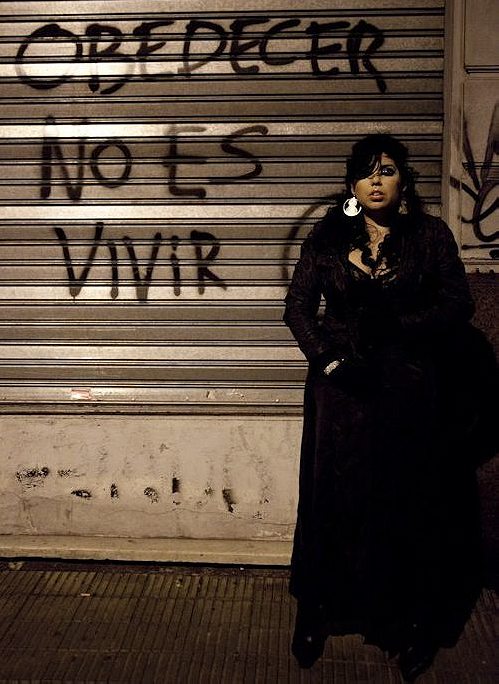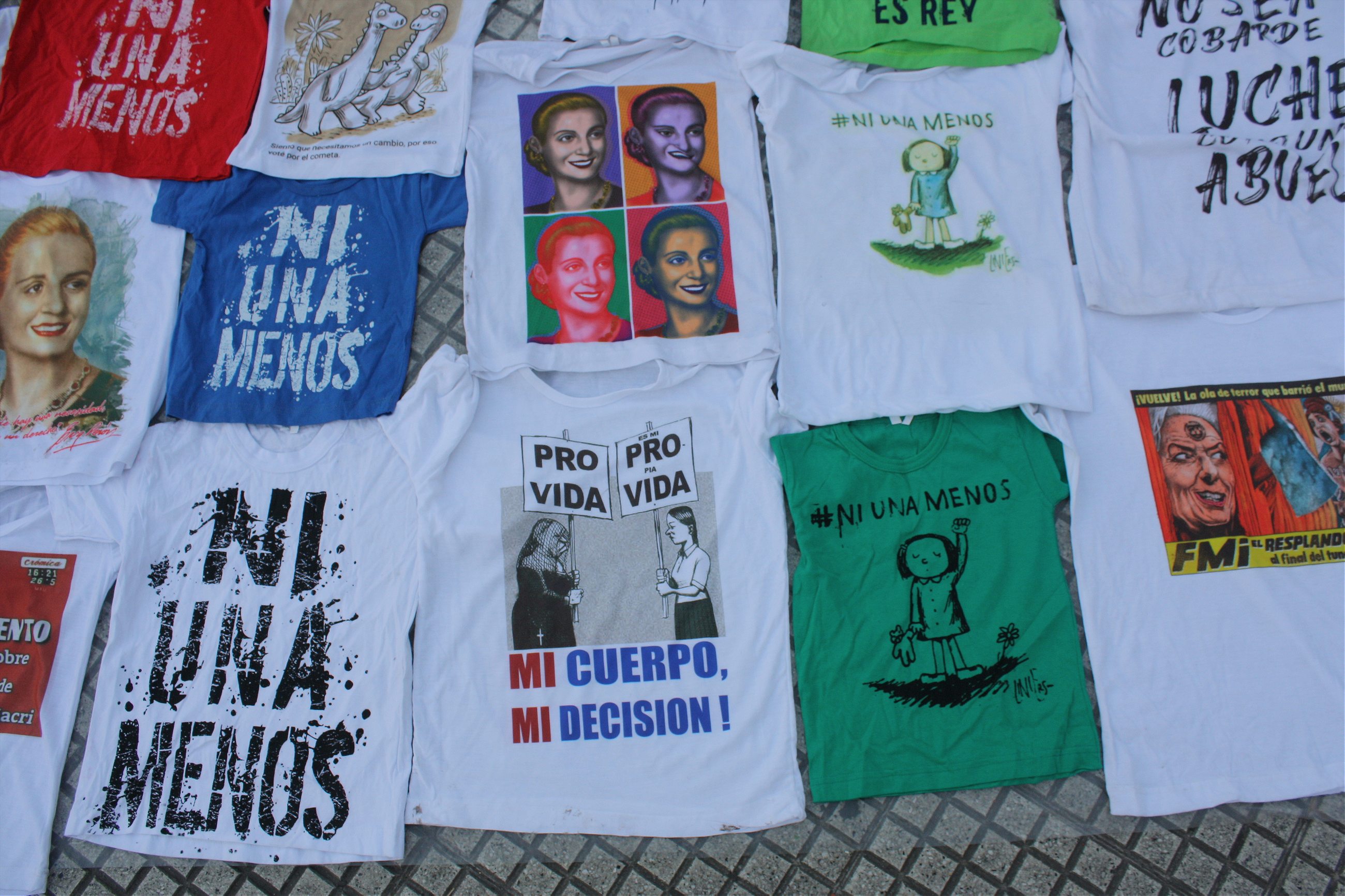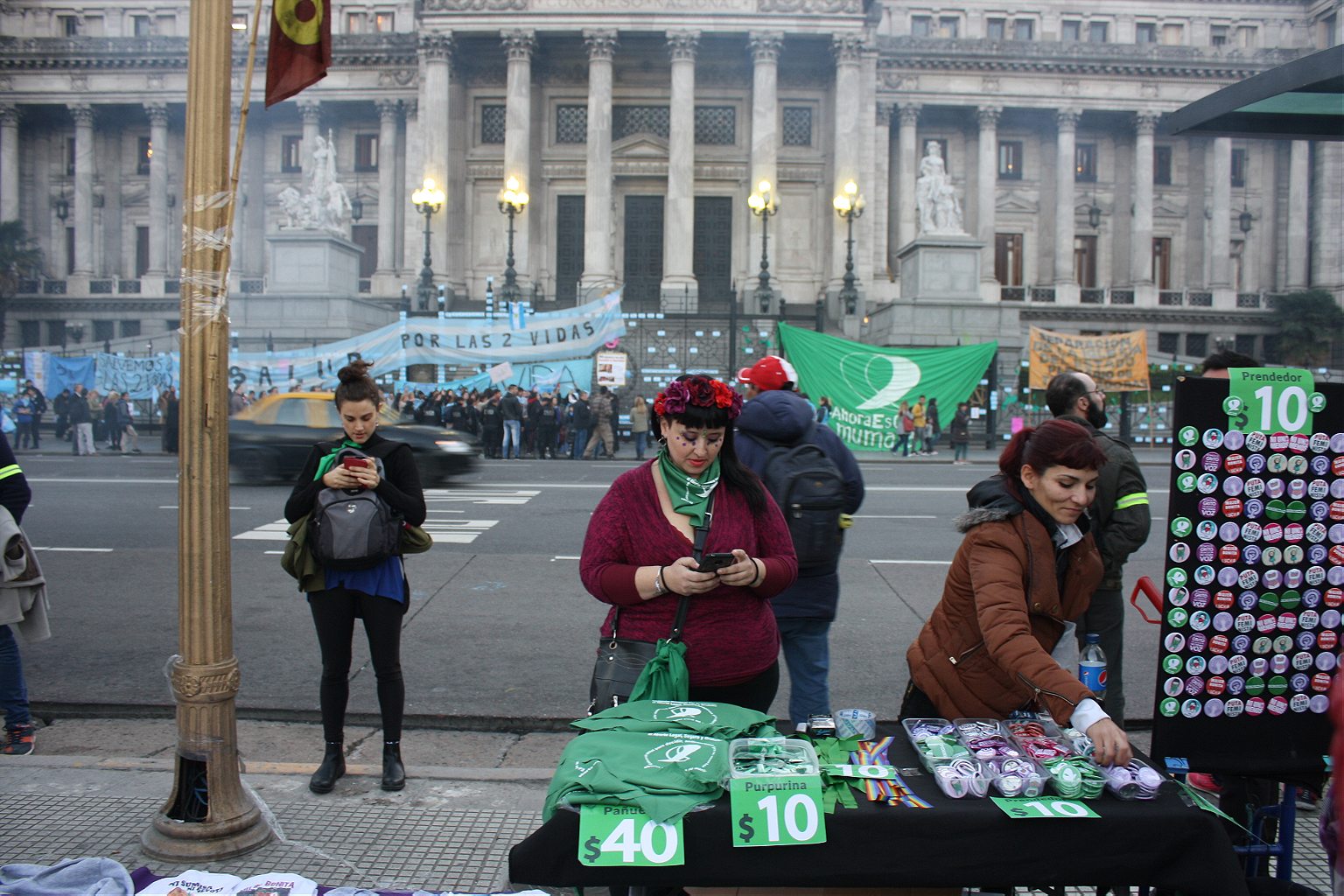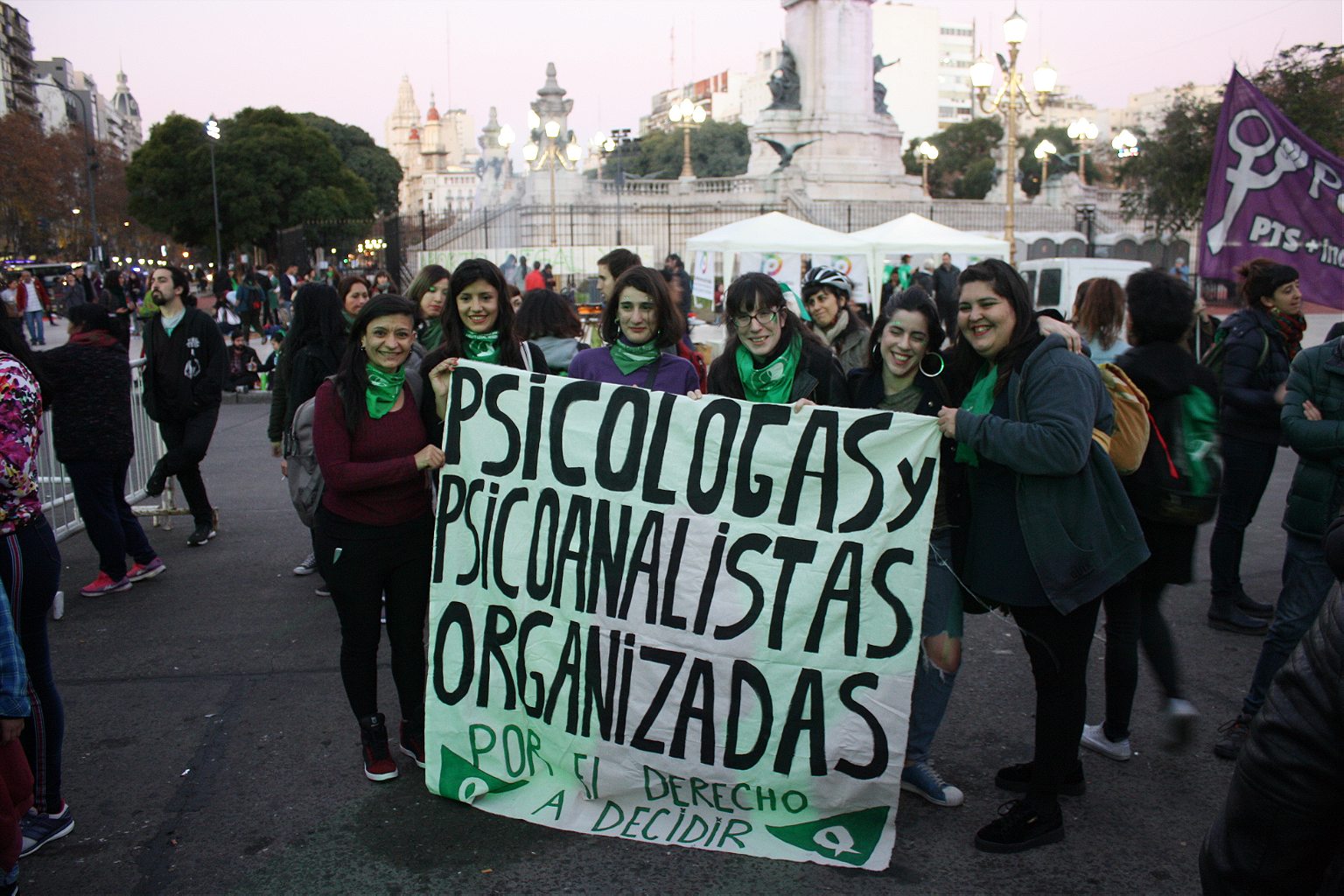Regular protests addressing violence against women in Argentina have led to a national debate about women’s rights in the country—particularly abortion.
One morning in December 2008, Daniela Luna woke up in an unfamiliar hotel room in Miami. Naked and disoriented, she was surrounded on either side by men she hardly knew—men who, like her, worked in the art world.
“I couldn’t understand what happened to me. I felt like I’d been run over by a train,” said Luna, a curator and artist, now 40. In a phone interview from Miami, she recalled how she tried to get a morning-after pill the following day, but it was only available with a prescription. On Christmas Day, after she had returned to Buenos Aires, she found out she was pregnant.
Luna decided to end the pregnancy—not a simple decision because abortion is illegal in Argentina—and found a doctor willing to perform the procedure, in a space she says felt safe.
In the weeks that followed, Luna retreated. A couple of months later, she closed the gallery and left Argentina on a one-way ticket to Beijing, where she stayed for a year before moving to the United States. Nobody would know her there, she figured.
Luna’s experience—or at least elements of it—are disturbingly familiar among Argentine women. With few exceptions, abortion is illegal in the country, yet exceedingly common: around 40 percent of all pregnancies—500,000, according to Human Rights Watch—end in abortion each year. Argentina’s health ministry estimates the range to be between 370,000 and 522,000. In the United States, around 20 percent of pregnancies end in abortion.

[Read: Meet the woman who won’t let Mexico forget a massacre]
A decade ago, when Luna was grappling with the decision to terminate her pregnancy, abortion was still a taboo subject in Argentina. She told a few friends, but felt she mostly had to keep the abortion to herself. “The laws have demanded secrecy, shame, and isolation,” she said.
But that may soon change. Last month, Argentina’s lower house of Congress passed a bill to legalize abortion in the first 14 weeks of pregnancy. The legislation passed by a slim margin—129 to 125, after 23 hours of debate—and goes before the Senate on August 8.
If Argentina legalizes abortion, it would be only the third country in Latin America to do so, after Cuba and Uruguay (abortion is also legal in Mexico City, but not in the rest of the country). And many people credit a broader movement, known as Ni Una Menos (Not One Less) for galvanizing public support for women’s rights—and creating momentum that abortion rights activists could build on.
Ni Una Menos began in 2015 following a wave of gender-based killings. According to a report by women’s rights group La Casa del Encuentro, a woman is killed in Argentina every 30 hours. Thousands of women across the country took to the streets to denounce violence against women and demand a change in policies and attitudes that they said contribute to the violence.
“The movement began as a response to the murders of hundreds of women and girls, but activists quickly argued that stopping femicide also requires targeting the machista mindset that fuels it, a culture in which femicides are traditionally considered crimes of passion and perpetrators can justify them with allusions to real or suspected infidelity,” wrote Argentine journalist Jordana Timerman in an op-ed for the New York Times.
Over the last three years, protesters have held regular demonstrations under the Ni Una Menos banner, and their movement has taken on a new breadth: demonstrations are no longer just about violence, or about the pay gap, or about access to contraception and safe, legal abortion. They are about all of it.
In recent months, the abortion debate has risen to the fore of the protest movement. According to the ministry of health, 80,000 women and girls are hospitalized each year due to complications from illegal abortions, and 31 women died as a result of unsafe procedures in 2016.
[Read: Inside Argentina’s nursing home for impoverished performers]

In a #MeToo-style expression of solidarity, more and more women—both public and private citizens—are sharing their abortion stories. Luna, who describes herself as “social-media phobic” was one of them, posting about her own abortion to Facebook in June. “I was inspired and moved by so many women opening up,” she said. “I’m not protecting anyone with my silence, not even myself.”
Another woman who has gone public with her abortion story is Gabriela Cerruti, a deputy for the Peronist Frente de la Victoria party. Several hours into the lower house debate, she delivered an impassioned eight-minute speech about having an abortion.
Many of the women sharing their stories say they were the lucky ones: they had the means to access safe abortions. Doctors who perform surgical abortions, and take on the risk of arrest, charge upwards of $1,000 for the procedure—nearly twice the monthly minimum wage. Women in the early stages of pregnancy often take Misoprostol, a drug that’s prescribed to treat ulcers but than can also cause miscarriage. Local advocates say these cost around $100 with a prescription, or $200 on the black market.
“I could pay for the pills because I am a professional, a middle-class person,” says Maria Florencia Alcaraz, a journalist and co-founder of LATFEM, a feminist news site. “But abortion must be legal. It must stop being a privilege for those who can afford it.”
Some politicians are taking heed. Argentina’s health minister said access to safe abortion is “fundamental”, and center-right President Mauricio Macri said he would not veto legislation to legalize the procedure (he maintains that he is personally pro-life).


Today Argentina’s opinion pages are filled with arguments in favor of and against the legislation. Abortion has become common dinner table discussion, with evermore women sharing their own experiences. And the streets of Buenos Aires now fill with protesters several times a week. They dress in green, the color of the movement, and carry signs with recognizable slogans like “My Body, My Decision.” The city sometimes feels like a blur of bright emerald as women and men carrying babies and holding the hands of little girls with green ribbons woven into their braids. Many wear green bandanas, knotted loosely around their necks, tied around ponytails, or twisted around purses and backpacks.
It’s an emblem that’s strikingly reminiscent of the pañuelos (handkerchiefs) that the Madres of Plaza de Mayo have been wearing since the late 1970s. That movement was started by 13 women who took to the streets in 1977 to demand justice for their missing children and grandchildren, many of whom were among the estimated 30,000 desaparecidos (the disappeared) by the country’s brutal military dictatorship. The Madres of Plaza de Mayo, who wore handkerchiefs to identify one other and subvert laws against public congregations, grew to the thousands and helped raise international awareness of the military government’s abuses.
Young Argentine women are fighting a different battle today. But many of them identify with the generations of women who stood in protest before them. “I am part of a generation of feminists who are granddaughters of the Mothers and Grandmothers of Plaza de Mayo,” Alcaraz said. Today, some of the Madres—some now in wheelchairs—can be seen alongside the younger protesters.
“They have vividly shown the power of women’s collective organizing and are part of a long lineage of women’s struggles in Argentina for a variety of causes, including feminist, human rights, and social justice causes,” said Barbara Sutton, a sociologist at the University at Albany.
The green wave is unstoppable. It opened consciences. And there’s no going back.
The fate of the bill is unclear at the moment, as opinion remains sharply divided in the country: According to a recent poll conducted by Opina Argentina, 44 percent of citizens support the legalization of abortion, with 41 percent currently in opposition (the remaining 15 percent, according to the poll, were undecided). In early July, La Nación reported that 36 senators were against the bill, 27 were in favor, and 9 were undecided.
Whatever happens in the coming weeks, many women’s rights activists believe that recent progress is definitive. “We won. Whatever the result. The green wave is unstoppable. It opened consciences. And there’s no going back,” journalist Mariana Carbajal tweeted after the bill passed in the lower house of Congress in June.
Thousands of miles away, Luna is watching the news unfold from her home in Miami. She noted the irony of abortion potentially becoming legal in her home country just as many in her adopted country worry that President Donald Trump’s new nominee for the Supreme Court threatens abortion rights in the United States.
“Part of me wishes I had stayed, and that I would have been part of all that is going on,” she said, adding that by no longer remaining silent about her abortion, she was, in some small way, able to be a part of the movement. “These times ask for courage. So I gave up my safe place to be part of the change.”